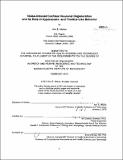Noise-induced cochlear neuronal degeneration and its role in hyperacusis -- and tinnitus-like behavior
Author(s)
Hickox, Ann E
DownloadFull printable version (8.017Mb)
Other Contributors
Harvard--MIT Program in Health Sciences and Technology.
Advisor
M. Charles Liberman.
Terms of use
Metadata
Show full item recordAbstract
Perceptual abnormalities such as hyperacusis and tinnitus often occur following acoustic overexposure. Although such exposure can also result in permanent threshold elevation, some individuals with noise-induced hyperacusis or tinnitus show clinically normal thresholds. Recent work in animals has shown that noise exposure can cause permanent degeneration of the cochlear nerve despite complete threshold recovery and lack of hair cell damage (Kujawa and Liberman, J Neurosci 29:14077-14085, 2009). Here we ask whether this noise-induced primary neuronal degeneration results in abnormal auditory behavior, indexed by the acoustic startle response and prepulse inhibition (PPI) of startle. Responses to tones and to broadband noise were measured in mice exposed either to a neuropathic exposure causing primary neuronal degeneration, or to a lower intensity, nonneuropathic noise, and in unexposed controls. Mice with cochlear neuronal loss displayed hyper-responsivity to sound, as evidenced by lower startle thresholds and enhanced PPI, while exposed mice without neuronal loss showed control-like responses. Gap PPI tests, often used to assess tinnitus, revealed spectrally restricted, as well as broadband, gap-detection deficits in mice with primary neuronal degeneration, but not in exposed mice without neuropathy. Crossmodal PPI tests and behavioral assays of anxiety revealed no significant differences among groups, suggesting that the changes in startle-based auditory behavior reflect a neuropathyrelated alteration specifically of auditory neural pathways. Despite significantly reduced cochlear nerve response, seen as reduced wave 1 of the auditory brainstem response, later peaks were unchanged or enhanced, suggesting neural hyperactivity in the auditory brainstem that could underlie the abnormal behavior on the startle tests. Taken together, the results suggest a role for cochlear primary neuronal degeneration in central neural excitability and, by extension, in the generation of tinnitus and hyperacusis.
Description
Thesis (Ph. D. in Speech and Hearing Bioscience and Technology)--Harvard-MIT Program in Health Sciences and Technology, 2013. Cataloged from PDF version of thesis. Includes bibliographical references (p. 46-57).
Date issued
2013Department
Harvard University--MIT Division of Health Sciences and TechnologyPublisher
Massachusetts Institute of Technology
Keywords
Harvard--MIT Program in Health Sciences and Technology.